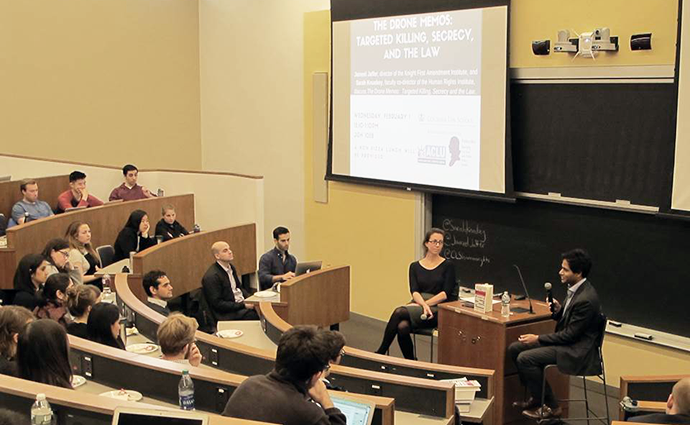Documenting Drone Strikes: A Conversation with Jameel Jaffer and Sarah Knuckey
Professor Sarah Knuckey spoke to human rights and civil liberties attorney Jameel Jaffer about his new book, The Drone Memos: Targeted Killing, Secrecy and the Law, earlier this month. |
There is “reason to be concerned” about President Barack Obama’s highly controversial drone strike program now being in the hands of his unexpected successor Donald Trump, said Jameel Jaffer, founding director of the Knight First Amendment Institute at Columbia University and former deputy legal director of the American Civil Liberties Union, during a recent talk at Columbia Law School.
“The new president has already made clear his intention to use these powers aggressively, with less transparency,” said Jaffer, who called the Obama administration’s controversial use of drones to carry out “targeted killings” of individuals linked to terror groups—including U.S. citizens—without trial or explanation a “legal outrage.” At the ACLU, Jaffer filed a lawsuit in 2011 on behalf of Nasser al-Awlaki, the Yemeni father of Anwar al-Awlaki, an American-born al-Qaida propagandist who was targeted and killed in a drone strike that year. Anwar al-Awlaki’s 16-year-old son was killed in another strike a few weeks later, and his eight-year-old daughter was reportedly killed last month in a raid in Yemen that was approved by Trump.
Together with Columbia Law School Professor Sarah Knuckey, Jaffer visited the Law School to discuss his new book, The Drone Memos: Targeted Killing, Secrecy and the Law—a compilation of legal and policy documents relating to the extrajudicial killing of suspected terrorists and militants by the U.S. government, a practice that expanded under Obama, particularly in countries like Yemen, Pakistan, and Somalia. Jaffer, who directed the ACLU litigation that led to the release of these documents, edited and wrote the introduction for the book, which was published in November.
Jaffer joined Columbia last year to start the Knight First Amendment Institute, a $60 million program with the mission of maintaining and expanding First Amendment rights and press freedom in the digital age.
Even losing lawsuits can play an important role in focusing public attention and sparking debate, Jaffer advised the students in attendance, as they gear up to hold the new administration accountable, as he has with Presidents George W. Bush and Obama. “Litigation alone, even if it is successful in court, is not successful unless it is paired with a change in public opinion.”
The Feb. 1 event was co-sponsored by the Columbia Law School Human Rights Institute, the Federalist Society, and the Columbia Law School chapter of the ACLU.
Responding to a student question, Knuckey, faculty co-director of the Law School’s Human Rights Institute and director of its Human Rights Clinic, compared the limited press coverage of a recent U.S. military operation in Yemen that killed a number of civilians with the significant press coverage of Trump’s immigration ban over the same weekend. She said that Americans’ lack of proximity to U.S. military operations made it “easy for the government to take certain actions without the effects fully being understood.” She noted that in the clinic, students have the opportunity to learn more about the actual human effects, including by interviewing families that lost relatives in U.S. strikes and working closely with Yemeni advocates on the impacts of the war there. “A common thread in the U.S. reporting on these strikes over last decade is that the human effects of them are marginalized.”
Jaffer agreed. “Violence with drones is often less visible to us...If we go in with the premise that this is justifiable violence, it makes sense to prefer not to send in soldiers. But often the alternative that drones are displacing is not ground invasion, but diplomacy.”
###
Posted February 14, 2017
